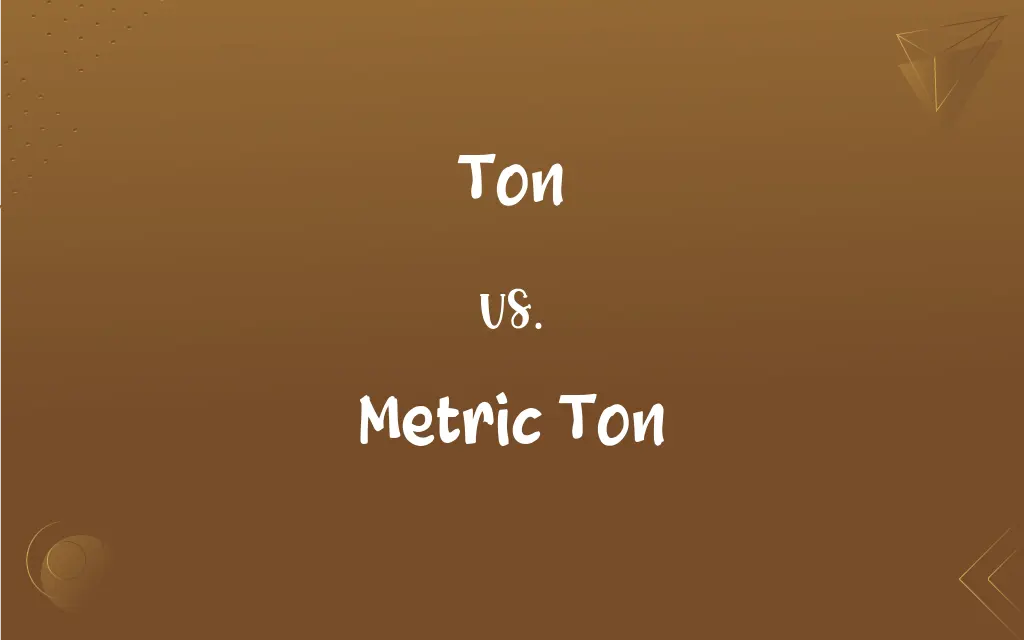Ton vs. Metric Ton: What's the Difference?
Edited by Aimie Carlson || By Harlon Moss || Updated on October 2, 2023
A ton, in the United States, is equivalent to 2,000 pounds, whereas a metric ton (or tonne) is 1,000 kilograms, equal to approximately 2,204.62 pounds.

Key Differences
In the U.S. and a few other countries, a ton is commonly used as a unit of mass and is equivalent to 2,000 pounds. A metric ton, on the other hand, is a unit of mass that is used worldwide and is equal to 1,000 kilograms. These two units, while related in their use as measurements of weight, differ in both size and global acceptance.
Understanding the difference between a ton and a metric ton is vital when engaging in international trade and calculations. The ton, sometimes referred to as the short ton, is primarily utilized in the United States. On the contrary, the metric ton is the global standard, accepted and understood by countries all around the world, thus making it crucial in international communication and transactions.
The existence of the ton and the metric ton exemplifies the inconsistencies between the Imperial and metric systems. A ton represents the Imperial system’s approach to mass, predominantly used in the U.S., while the metric ton embodies the metric system’s approach, which is accepted internationally. These differences underscore the varying systems that have developed over time, reflecting historical and cultural variations in measurement systems.
Interestingly, the UK has its own "ton" variant - the long ton, which is equal to 2,240 pounds, further adding to the complexity and variation found in these units of measurement. This means that in international trade, the metric ton often becomes the default standard for weight due to its consistent and universal understanding, in contrast to the diverse and varied understanding of the ton.
The specificity of terminology becomes crucial when dealing with precise calculations, where misunderstanding the difference between a ton and a metric ton could lead to significant discrepancies. The use of metric ton often becomes preferred in scientific, international trade, and technical applications to ensure clear, standardized communication and avoid misunderstandings that might arise due to the varied definitions of the ton.
ADVERTISEMENT
Comparison Chart
Basic Definition
2,000 pounds
1,000 kilograms
System of Measurement
Imperial
Metric
Global Usage
Limited
Widespread
Symbol
Denoted by T
Denoted by t
In Scientific Usage
Less common
More common
ADVERTISEMENT
Ton and Metric Ton Definitions
Ton
A unit of weight equivalent to 2,000 pounds.
The elephant weighs nearly 6 tons.
Metric Ton
A unit of weight equal to 1,000 kilograms.
The cargo weighed 4 metric tons.
Ton
A word used to indicate a large amount or degree.
We had a ton of fun at the party.
Metric Ton
Used in scientific and technical contexts.
The probe weighed approximately one metric ton.
Ton
A measure of cooling capacity.
The air conditioner has a capacity of 2 tons.
Metric Ton
Common in global maritime and freight industries.
The vessel can hold 2,000 metric tons of cargo.
Ton
A metric used in shipping and freight.
The shipment was over 20 tons.
Metric Ton
Standard unit in international trade.
The grain was sold by the metric ton.
Ton
Used informally to mean a high speed.
He drove at a ton down the freeway.
Metric Ton
Utilized in countries using the metric system.
European countries measure large cargo in metric tons.
Ton
A unit of weight equal to 2,000 pounds (0.907 metric ton or 907.18 kilograms). Also called net ton, short ton.
Ton
A unit of weight equal to 2,240 pounds (1.016 metric tons or 1,016.05 kilograms). Also called long ton.
Ton
A metric ton. See Table at measurement.
Ton
A unit of capacity for cargo in maritime shipping, normally estimated at 40 cubic feet.
Ton
A unit for measuring the displacement of ships, equal to 35 cubic feet, and supposed to equal the volume taken by a long ton of seawater.
FAQs
What is a ton?
A ton is a unit of weight equivalent to 2,000 pounds.
What is a metric ton?
A metric ton, or tonne, is a unit of weight equal to 1,000 kilograms.
Is a ton always a unit of weight?
Predominantly yes, but it can be used informally in other contexts to mean “a lot” or “a high speed.”
Which countries primarily use the ton?
The ton is primarily used in the United States and a few other countries.
Where is the metric ton commonly used?
The metric ton is used worldwide, especially in countries on the metric system.
Can a ton and a metric ton be used interchangeably?
No, they represent different weights and should be used accurately according to their respective definitions.
What is the long ton?
The long ton, used in the UK, is equal to 2,240 pounds.
Is there a symbol for ton and metric ton?
“T” is sometimes used for ton, and “t” is used for metric ton.
Why is the metric ton more common in scientific contexts?
The metric ton is part of the metric system, which is standardized and decimal-based, making it easier to use in scientific calculations.
Is the metric ton known by any other names?
Yes, it is often simply referred to as a "tonne" in countries using the metric system.
Is there a difference in how ton and metric ton are used in industries?
Yes, industries dealing with international trade, science, and technology often prefer using the metric ton for its universal understanding.
Are ton and metric ton ever used in discussing volume?
Typically, no, as both are units of weight, not volume.
How are ton and metric ton used in automotive industries?
The ton might be used in the U.S. automotive industry to describe vehicle weight, while metric ton might be used similarly in other countries.
Why does the UK use a different variant of the ton?
Historical and cultural reasons have influenced the UK’s use of its own measurement system, which includes the long ton.
How is the metric system related to the metric ton?
The metric ton is a unit of mass within the metric system, which is decimal-based and used internationally.
How precise should usage be in technical and scientific contexts?
Extremely precise – the accurate use of ton and metric ton is crucial to avoid misunderstandings in technical and scientific data.
What industries typically use the term ton?
In the U.S., various industries like freight, automotive, and agriculture may use the ton.
Can understanding of the ton vary between countries?
Yes, as the U.S. and the UK have different versions (short ton and long ton), awareness and application can vary.
Does the shipping industry prefer ton or metric ton?
The shipping industry commonly uses the metric ton due to its widespread international recognition and standardization.
In what context is the informal use of ‘ton’ (meaning a lot) appropriate?
This informal use is generally appropriate in casual conversation, not in formal or technical communication.
About Author
Written by
Harlon MossHarlon is a seasoned quality moderator and accomplished content writer for Difference Wiki. An alumnus of the prestigious University of California, he earned his degree in Computer Science. Leveraging his academic background, Harlon brings a meticulous and informed perspective to his work, ensuring content accuracy and excellence.
Edited by
Aimie CarlsonAimie Carlson, holding a master's degree in English literature, is a fervent English language enthusiast. She lends her writing talents to Difference Wiki, a prominent website that specializes in comparisons, offering readers insightful analyses that both captivate and inform.






































































